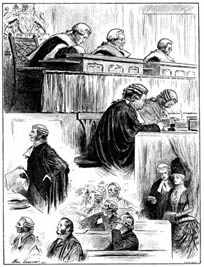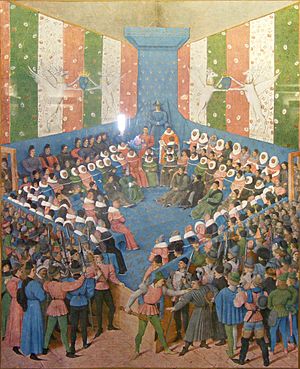Trial facts for kids


A trial is a formal meeting in a court where two sides present their arguments. This happens to solve disagreements or to decide if someone has broken the law.
Contents
What Happens in a Trial?
In a trial, a judge is in charge of the courtroom. The judge decides who speaks and what information or arguments can be used. Sometimes, a group of people called a jury helps. The jury listens to all the information and decides if a person is guilty or not guilty. If there is no jury, the judge makes this decision alone.
Civil Trials: Solving Disagreements
In a civil trial, two sides, usually individuals or groups, have a disagreement. One side, called the plaintiff, believes they have been wronged. They try to show the court why the other side, called the defendant, should pay them money or do something to fix the problem. Civil trials are about solving private disputes, not about crimes.
Criminal Trials: Deciding About Crimes
In a criminal trial, the prosecutor works for the government. Their job is to try and prove that the defendant committed a crime. If the defendant is found guilty, the judge decides on a punishment, also known as a "sentence." For serious crimes, a person might go to prison. For less serious actions, there might be a fine, which is money that must be paid. Also, the person might get a criminal record.
How Long Do Trials Take?
Getting a trial started can take a while because courts are often very busy. In some places, like the United States, it can take many months to get a court date. Important trials can sometimes last for years, as both sides need a lot of time to gather information and prepare their arguments.
Military Trials: Court-Martial
A special type of trial for people in the military is called a court-martial. These trials follow different rules that apply specifically to military members.
How Trials Are Different Around the World
Trials are not the same everywhere. Different countries, cities, and states have their own laws. These laws change how trials happen. Some trials might be very short, while others can be quite long, depending on the rules and the seriousness of the case.
See also
 In Spanish: Juicio para niños
In Spanish: Juicio para niños

